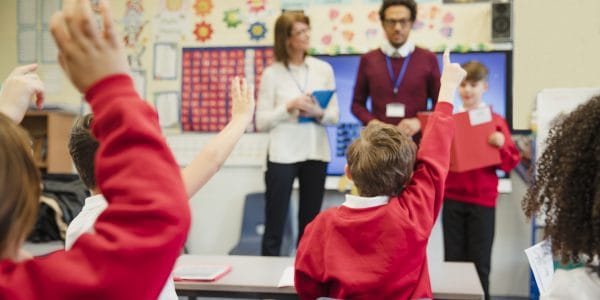
23/03/22
3 min read
There is a substantial risk that teacher recruitment targets will not be met this year across a large range of secondary subjects, including English, a subject that usually meets its target. There are also recruitment challenges in subjects that tend to recruit well, including geography, biology, art and religious education.
The Teacher Labour Market in England Annual Report 2022, published by the National Foundation for Educational Research (NFER) and funded by the Nuffield Foundation, also projects that there will be a recruitment shortfall in persistent shortage subjects. For example, physics is estimated to be recruiting at less than 20% of the level required to meet its target. Recruitment challenges will continue for other subjects, including maths, chemistry, computing, design and technology and modern foreign languages.
The latest cohort of initial teacher training applicants will not start teaching in schools until September 2023, giving the government and schools a window of time to plan and take action. Without action to address teacher recruitment and retention, shortages may negatively impact on pupils’ education and learning.
Commenting on the report, NFER School Workforce Lead, Jack Worth said:
“The evidence seems clear that teacher supply challenges across subjects are re-emerging after two years of having eased due to the pandemic. Tackling this effectively requires policy action to improve the financial and non-financial attractiveness of teaching.
“Improving the competitiveness of teachers’ pay is important for both recruiting and retaining teachers, but while the government has proposed pay increases for teachers, the increases seem insufficient on their own to address the emerging recruitment and retention challenges.
“Ensuring teachers’ workloads are manageable could be an important part of a strategy to improve supply by reducing the numbers of teachers leaving, but our analysis indicates that teacher workload remains a significant issue as more than half of full-time teachers perceive that they work too many hours.
“Support for trainees and early-career teachers from their experienced colleagues as they begin their careers is another important non-financial factor for retention. However, our survey data shows that schools’ capacity for offering training placements remains squeezed, and senior leaders’ key concern is the burden on school staff to provide support for trainees.”
Cheryl Lloyd, Education Programme Head at the Nuffield Foundation said:
“More substantial interventions are needed to encourage applicants to initial teacher training courses including physics, maths and modern foreign languages. Addressing the ongoing shortfalls in teacher training applications should be a priority to ensure students can benefit from specialist teaching in these subjects and that schools across the country can offer a breadth of course options to their students. This report also highlights that recruitment challenges are becoming more widespread, with a reduction in applicant numbers for teacher training in subjects which have typically recruited well in the past, including English, geography and art.”
Teacher recruitment and training
- In February 2022, the number of Initial Teacher Training (ITT) applications are 23% lower than in February 2021.
- Schools’ capacity to mentor trainees and new teachers is likely to remain under strain due to a range of pressures. This could be linked to the increased demand for schools’ mentoring capacity as a result of the Early Career Framework (ECF) national rollout, which began in September 2021.
Teacher well-being and retention
- Teacher retention rates, which had improved substantially in 2020 during the pandemic, due to economic uncertainty and lockdown, also appeared to be returning towards pre-pandemic levels in 2021, due to the returning wider labour market opportunities.
- Teachers’ real-terms pay is now lower than a decade ago, whereas the pay of similar individuals in other professions is around the same as in 2010/11 in real terms. This loss of competitiveness in teacher pay is likely to have contributed, at least in part, to increasing leaving rates and the supply challenges that developed during the 2010s. Increasing the competitiveness of teacher pay faster than pay in the rest of the economy is likely to increase both recruitment and retention, but the overall increase in teacher pay proposed by the government over the next two years is the same rate as pay is expected to rise in the rest of the economy.
- Teachers continue to work longer hours than similar individuals in other professions during term time and are more likely to want to work fewer hours.
Recommendations
- The government should maintain the London teacher pay premium at its current level to avoid exacerbating teacher shortages in London schools.
- The government should take action to ensure schools have sufficient long-term mentoring capacity to support the increasing numbers of trainees and new teachers entering the system.
- Reducing teacher workload and supporting teacher well-being should remain a high priority for the government.





































